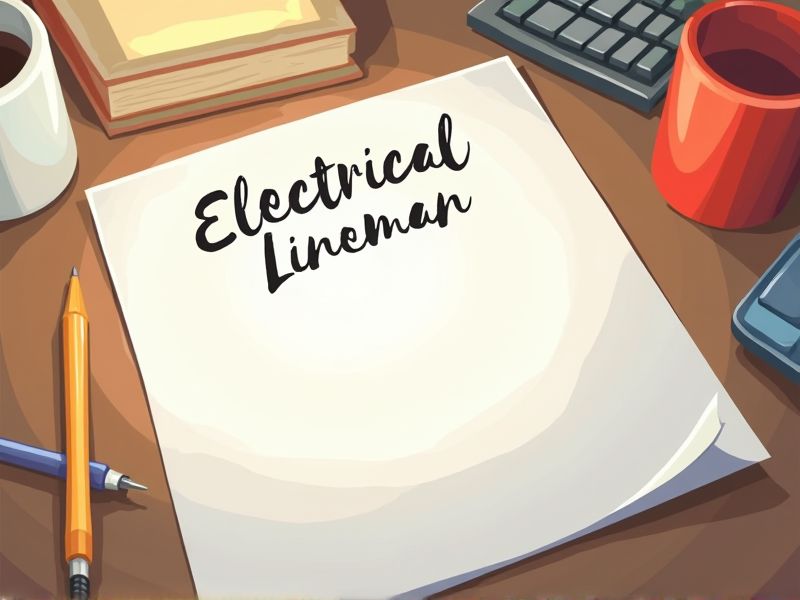
The role of an Electrical Lineman involves maintaining and repairing power lines, a task that presents significant safety risks. Certifications ensure that linemen have the essential knowledge and skills to handle these risks effectively. They also verify their competence in following regulatory standards and safety protocols critical for the job. Essential certifications for aspiring Electrical Linemen include OSHA 10, CPR certification, and a Class A Commercial Driver's License.
OSHA 10-Hour Construction Safety Certification
The OSHA 10-Hour Construction Safety Certification is essential for electrical linemen to reduce workplace accidents, as it provides fundamental safety training relevant to their high-risk environment. Receiving this certification often leads to a decrease in liability and insurance costs for employers, as it signifies that workers are trained in essential safety practices. Understanding OSHA regulations through this certification helps electrical linemen remain compliant with legal safety standards, thereby avoiding fines and penalties. The training reinforces critical safety concepts that can prevent serious injuries or fatalities, which are significant risks in the linework field.
OSHA 30-Hour Construction Safety Certification
The OSHA 30-Hour Construction Safety Certification is essential for electrical linemen as it provides a comprehensive understanding of job site hazards, ensuring safer working environments. Electrical linemen face high risks from exposure to live wires, and certification helps in understanding and mitigating these electrical hazards. This certification also equips linemen with knowledge about federal safety regulations, promoting compliance and reducing legal liabilities. By emphasizing safety training, the certification directly contributes to decreasing accident rates and enhancing overall workplace productivity for linemen.
NFPA 70E Electrical Safety Certification
The NFPA 70E Electrical Safety Certification is needed for electrical linemen as it provides standardized safety procedures that reduce the risk of electrical accidents and injuries. Compliance with these standards ensures linemen are knowledgeable in hazard assessment and the proper use of personal protective equipment. Certification mandates training in safety practices, leading to a decrease in workplace incidents related to electrical work. Employers benefit from having certified linemen as it highlights their commitment to safety, potentially reducing liability and insurance costs.
Arc Flash Awareness Training Certification
Arc Flash Awareness Training Certification is essential for electrical linemen to enhance their understanding of the potential hazards associated with arc flash incidents. The certification provides linemen with the skills to implement safety measures, directly reducing the risk of electrical injuries. OSHA regulations often mandate this training to ensure compliance with safety standards. Certification helps in fostering a culture of safety, potentially decreasing workplace accidents and improving overall operational efficiency.
Working at Heights Certification
Electrical linemen often work at significant heights, and having Working at Heights Certification ensures they are equipped with the necessary safety skills to minimize fall risks. In 2020, falls were the leading cause of fatal work injuries, underscoring the need for proper safety training. This certification mandates training in using harnesses and fall prevention systems, crucial for mitigating accidents. Employers also benefit as they comply with safety regulations, reducing potential liabilities and promoting workplace safety culture.
CPR and First Aid Certification
Electrical linemen often encounter high-risk situations, where CPR and first aid certification equips them with the necessary skills to respond effectively to electrical injuries and accidents. Knowledge of these emergency procedures increases the chances of survival in cases of cardiac arrest or trauma resulting from electrical shocks. Certified individuals are better prepared to stabilize injured colleagues until professional medical assistance arrives. This certification fosters a safer work environment, reducing potential injury-related downtime and enhancing overall team safety.
Confined Space Entry Certification
Confined Space Entry Certification ensures electrical linemen are trained to recognize and handle the hazards present in restrictive environments, minimizing risks of injury or fatal accidents. Entering confined spaces often poses exposure to unsafe atmospheric conditions or potential electrical hazards, and certification provides the necessary skills to navigate these threats safely. Regulatory bodies, such as OSHA, mandate such certifications to maintain standard safety protocols, thus compliance is essential. Employers mitigate liability and enhance workplace safety by ensuring linemen are certified, reinforcing operational integrity and worker protection.
National Electrical Safety Code (NESC) Training Certification
Obtaining the National Electrical Safety Code (NESC) Training Certification ensures that electrical linemen are knowledgeable about the latest safety standards, reducing accident risks. The certification enforces adherence to standardized safety procedures, fostering a safer working environment. Understanding NESC guidelines equips linemen to handle electrical infrastructure efficiently, preventing service disruptions. Employers recognize this certification as a measure of a lineman's competence and commitment to workplace safety, enhancing job prospects.
High Voltage Safety Training Certification
High Voltage Safety Training Certification ensures electrical linemen understand procedures to prevent accidents and injuries when working with dangerous electrical currents. This certification equips them with knowledge to handle high voltage equipment safely, reducing the risk of electrical shocks and fatalities. Trained linemen can identify potential hazards and implement safety measures effectively, ensuring a safer working environment. Employers often require this certification to comply with industry regulations and standards, minimizing liability in case of workplace incidents.
Rigging and Signal Person Certification
Rigging and Signal Person Certification ensures that electrical linemen can safely handle and move heavy equipment, reducing the risk of workplace accidents. Proper certification provides linemen with the necessary skills to interpret signals accurately, which enhances communication during complex rigging tasks. Trained linemen minimize downtime and project delays by efficiently coordinating movements of equipment and materials. Certification aligns with industry standards, ensuring compliance with safety regulations and protecting both workers and employers from potential liabilities.
Summary
When you earn certifications as an Electrical Lineman, you enhance your professional credibility and increase your job prospects. Certified linemen typically see higher earning potential and improved job security. You also gain advanced skills and knowledge, leading to greater efficiency and safety on the job. Employers often prefer certified professionals, potentially giving you access to more prestigious roles or specialized projects.
